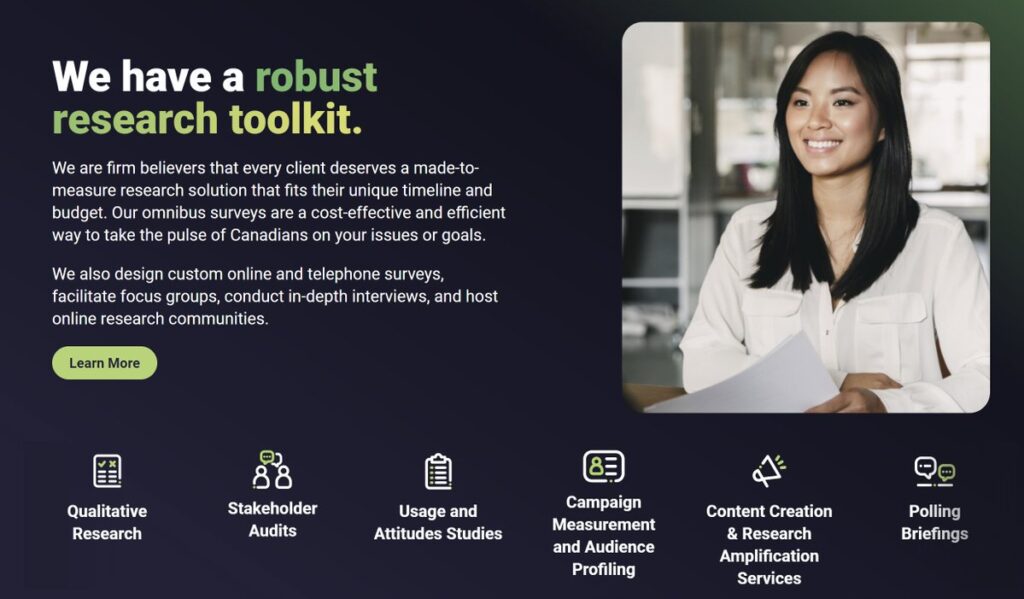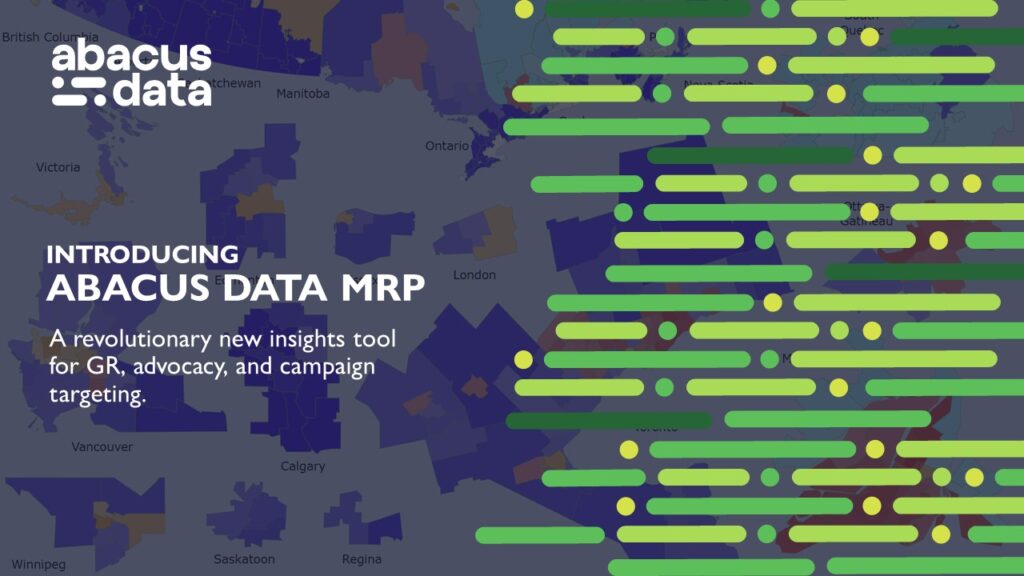Why did Ontario voters vote the way they did? A debrief on the 2025 Ontario provincial election
Ontario’s latest provincial election proved to be another decisive win for Doug Ford’s Progressive Conservatives, securing about 43% of the vote and clinching a third straight majority with 80 seats at Queen’s Park. Despite the PCs’ commanding performance, the Ontario New Democrats maintained their grip on Official Opposition status, underscoring a surprising resilience among progressive voters. Meanwhile, the Ontario Liberals managed to bounce back in terms of overall support but saw those gains translate into fewer seats than they had hoped. It’s an outcome that leaves observers wondering how affordability, leadership perceptions, and local candidate appeal combined to deliver such a strong mandate for Ford while reshaping the province’s political landscape along the way.
In order to capture the most authentic motivations behind voters’ preferences, we employed an open-ended survey technique. Rather than relying on predetermined response options, this method allowed participants to articulate their reasons for supporting a particular party in their own words. By eliminating multiple-choice constraints, the feedback we received was richer, more nuanced, and better reflected the genuine sentiments of the electorate.
Eligible voters in Ontario in our final survey (days before the election) were simply asked: “In a few words, why did you vote for or why are you planning to vote [PARTY NAME]?” We then coded recurring themes—such as leadership, policy issues, and local candidate appeal—while retaining direct quotations to capture the colour and depth of respondents’ opinions.
This approach granted us insight into not only the topics driving voter decision-making, but also the emotional resonance and personal stories behind these choices. In the summaries that follow, we highlight key patterns and illustrative quotes for each major party, providing a window into the motivations behind Ontarians’ political allegiances.
Ontario PC Voters
Many PC supporters emphasized Doug Ford’s perceived strength on economic and fiscal matters. A considerable number pointed to his ability to “stand up to Trump” or handle U.S.-imposed tariffs—several explicitly mention that he is “the only one” who can fight for Ontario’s interests in cross-border disputes. Some cited a broader sense of stability: “He’s already done more for Ontarians than previous leaders,” or, more pragmatically, “Go with the devil you know.”
A significant theme was wariness toward other parties: respondents frequently reference distrust of Liberals, perceived fiscal irresponsibility from the NDP, or disillusionment with previous governments. One voter wrote, “I will never vote Liberal; they ruined our country,” while others declare that there is “no alternative” but the PCs. For these individuals, Ford represents a safer bet, even if they do not wholly endorse every aspect of his record.
Personal approval of Ford himself surfaces often, with descriptors like “approachable,” “real,” “people person,” and “down to earth.” Some point to specific policies—support for infrastructure, job creation, or roads—as evidence of good governance. Another recurring theme is confidence in Ford’s ability to manage cost-of-living challenges. “He’s trying to reduce the cost of living,” one voter says, capturing a sentiment echoed by others.
A minority of responses acknowledge Ford’s imperfections—several mention mistakes or policy missteps—but still deem him preferable to other leaders. One wrote, “He pulled a few fast ones, but he has Ontario’s best interest at heart.” Another admitted voting for him despite wanting to vote NDP, purely to avoid a Liberal win. Overall, this data reveals that most PC-leaning voters believe Doug Ford offers the best balance of strong leadership, economic pragmatism, and resilience in the face of external pressures—particularly from south of the border.
Ontario NDP Voters
A dominant theme among NDP supporters was the desire for a change in government, with many respondents indicating frustration or disappointment with both the PCs and the Liberals. Multiple voters explicitly mention that neither party “did it” for them, so they’re turning to the NDP for a fresh approach. A significant number point to the NDP’s policies on affordability and social programs—especially promises to “help the poor,” “cut grocery prices,” and build “more affordable housing.” Healthcare also features prominently; some highlight pledges to “hire more doctors” or “fix the schools,” expressing hope that the NDP will prioritize these concerns.
Marit Stiles herself garners praise for appearing “competent,” “trustworthy,” and “sincere.” Many respondents say she aligns with their personal values, referencing social justice, middle-class needs, and a focus on helping “the under dog.” Others appreciate her perceived integrity and “tough on the issues” stance, contrasting her approach with what they see as the failings of Doug Ford and other leaders. A few claim to be life-long NDP supporters, while others view Stiles’ leadership as the best way to unseat the current government.
Local candidates also matter. Several voters credit their decision to strong NDP representatives who “deserve to be re-elected.” Some even admit they’re voting strategically, believing the NDP is the “best chance to beat PC in my riding.” Overall, these responses convey an expectation that the Ontario NDP will prioritize everyday people, focus on key social and economic challenges, and provide a credible alternative to the status quo.
Ontario Liberal Voters
A central theme among Ontario Liberal Party supporters was also the desire to remove Doug Ford and the Progressive Conservatives from office. Many explicitly state that their vote for the Liberals is a strategic move to defeat Ford, with comments like “Best chance to defeat the PC candidate in my riding,” or “I’m voting Liberal so Ford can’t get a majority.” Several respondents also mention fatigue with Ford’s perceived mismanagement, pointing to healthcare cutbacks, wasted spending, or disagreements with his infrastructure plans. For them, Crombie represents a needed change and a credible challenger.
Bonnie Crombie herself is repeatedly described as “approachable,” “honest,” and someone who “cares about people,” with supporters lauding her stance on healthcare, education, and cost-of-living issues. Those referencing her record as Mississauga’s mayor praise her leadership experience and “ability to run the province.” Healthcare emerges as a major priority: many cite Crombie’s promise to invest in public hospitals, hire more doctors, or otherwise strengthen the system. Others point to her support for ODSP, emphasis on helping “hardworking people,” and readiness to stand up to both Doug Ford and external pressures (like Trump or tariffs). Some are life-long Liberals who simply want to see their party back in power, while others say they’re switching from the NDP or have always been non-partisan, but trust the Liberals’ platform more than any other.
Overall, these responses underscore a blend of policy alignment—especially on healthcare and social programs—and strategic calculation: many see the Liberals as the most viable option to unseat Ford while pursuing a more progressive, people-centered agenda.
The Upshot
rom the voters’ own words, it’s clear that Doug Ford’s 2025 win can be traced to a mix of perceived reliability, familiarity, and a belief that he alone could stand up to both American pressures—like President Trump’s tariffs—and local affordability challenges. Many PC supporters repeated variations of “he can handle the U.S. better than the rest,” indicating that Trump loomed large in the election conversation. Others saw Ford as more grounded in the day-to-day struggles of Ontarians, referencing the rising cost of living and the need for a leader who could tackle it head-on. Even some who admitted misgivings about Ford stuck with him, describing him as “the devil you know,” a safer choice than untested or less-trusted alternatives.
Meanwhile, the Ontario NDP and Liberals both promised significant changes, focusing on social justice, healthcare, and affordability. Marit Stiles captured imaginations with her emphasis on helping “the under dog,” and many praised her party’s grassroots engagement and local candidate strength. Bonnie Crombie’s Liberals highlighted a plan for healthcare investment and cost-of-living relief, and she personally inspired confidence as an experienced mayor. Despite that, key respondents repeatedly stated they were picking the Liberals or NDP “to stop Ford,” rather than out of wholehearted support—an admission that strategic voting sometimes overshadowed detailed policy preferences.
Ultimately, while Ford’s opponents offered robust platforms for change, they struggled to generate the same sense of stability that many Ontarians craved. Voters worried about U.S. tariffs, felt heightened economic anxiety, and looked for someone who could handle the biggest issues—especially affordability—without rocking the boat too much. In the end, those concerns gave Ford the edge. The NDP and Liberals, though appreciated for progressive values and fresh leadership, simply couldn’t overcome the widespread perception that Ford was best equipped to take on Trump and keep Ontario’s economy afloat.
You can find out more about what happened in the Ontario election by reading this in-depth interview I did with Martin Regg Cohn of the Toronto Star:

METHODOLOGY
The survey was conducted with 1,000 eligible voters in Ontario from February 24 to 25, 2025.
A random sample of panelists were invited to complete the survey from a set of partner panels based on the Lucid exchange platform. These partners are typically double opt-in survey panels, blended to manage out potential skews in the data from a single source.
The margin of error for a comparable probability-based random sample of the same size is +/- 3.1%, 19 times out of 20.
The data were weighted according to census data to ensure that the sample matched Ontario’s population according to age, gender, educational attainment, and region. Totals may not add up to 100 due to rounding.
This survey was paid for by Abacus Data Inc.
Abacus Data follows the CRIC Public Opinion Research Standards and Disclosure Requirements that can be found here: https://canadianresearchinsightscouncil.ca/standards/
ABOUT ABACUS DATA
We are Canada’s most sought-after, influential, and impactful polling and market research firm. We are hired by many of North America’s most respected and influential brands and organizations.
We use the latest technology, sound science, and deep experience to generate top-flight research-based advice to our clients. We offer global research capacity with a strong focus on customer service, attention to detail, and exceptional value.
And we are growing throughout all parts of Canada and the United States and have capacity for new clients who want high quality research insights with enlightened hospitality.
Our record speaks for itself: we were one of the most accurate pollsters conducting research during the 2021 Canadian election following up on our outstanding record in the 2019, 2015, and 2011 federal elections.
Contact us with any questions.
Find out more about how we can help your organization by downloading our corporate profile and service offering.














































































































